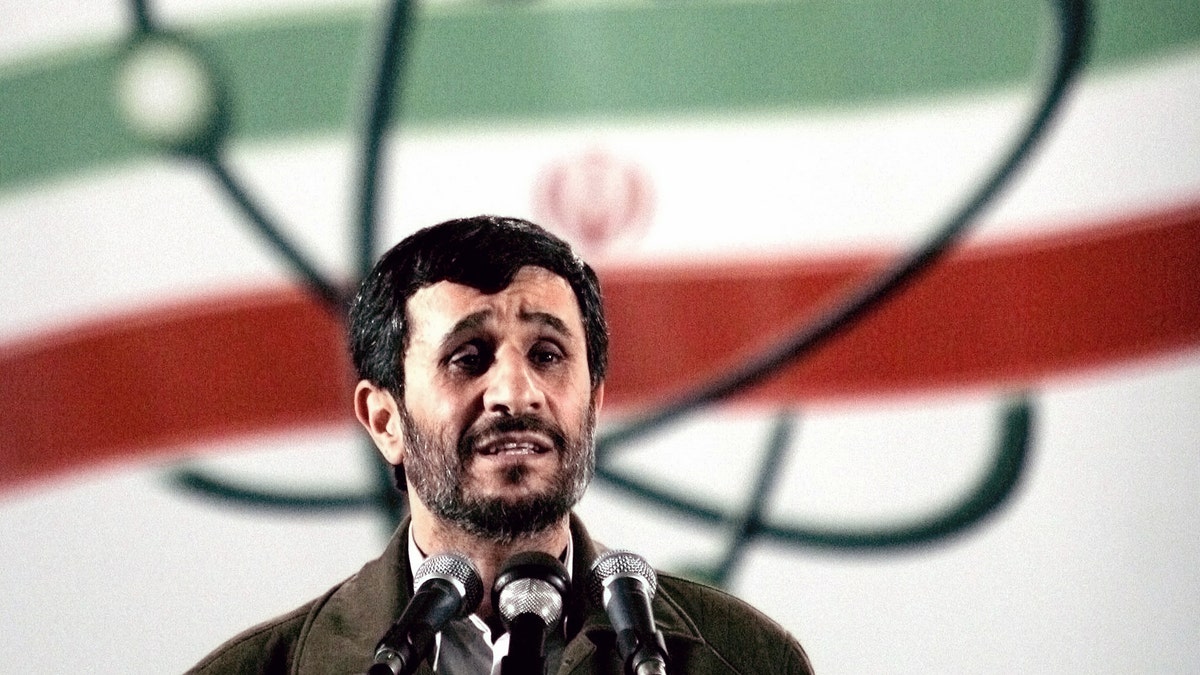
TO GO WITH STORY IRAN NUCLEAR -FILE- In this April 9, 2007, file photo, Iranian President Mahmoud Ahmadinejad speaks at a ceremony in Iran's nuclear enrichment facility in Natanz, south of capital Tehran, Iran. Technicians upgrading Iran’s main uranium enrichment facility have tripled partial or full installations of high-tech machines that could be used in a nuclear weapons program to more than 600 since starting their work three months ago, according to diplomats who demanded anonymity because they said they are not authorized to disclose the information, Wednesday April 17, 2013. (AP Photo/Hasan Sarbakhshian, File) (The Associated Press)
TEHRAN, Iran – The Iranian president on Thursday slammed the West for its naval presence in the Persian Gulf while the country's army commanders warned archenemy Israel against any military strikes on Iran.
President Mahmoud Ahmadinejad said "foreign presence" was the source of insecurity in the Gulf and the strategic Strait of Hormuz, a key waterway through which about one-fifth of the world's oil supply passes.
Iran, on the other hand, he claimed, has "always guarded peace and security."
The remarks — typical rhetoric from the Iranian president — came ahead of a military parade in Tehran as Iran marked National Army Day. And while the Iranian president didn't name any specific country, his remarks were an apparent reference to Western nations and the U.S. 5th Fleet, based in Bahrain.
Iran sees the large American-led naval presence in the Gulf as foreign military meddling in the Mideast. Tehran has in the past year warned it could close the Strait of Hormuz in retaliation for tighter Western sanctions over its controversial nuclear program, but later stepped back from those threats.
Also Thursday, Iran's navy held its own show of force near the Strait of Hormuz, with state TV broadcasting a display of Russian-made Kilo class submarines that Tehran obtained in the early 1990s.
On the sidelines of the parade in the Iranian capital, Iran's army chief of staff warned Israel.
"We see Israel's threat as a scream that comes out of fear," said Gen. Hasan Firouzabadi. "If they do anything wrong, there will be no Israel left on the world's political map."
Iran's army chief Gen. Attaollah Salehi also warned Israel, saying that "Iran's army is ready to carry out" any order by the Supreme Leader Ayatollah Khamenei against the Jewish state. In March, Khamenei warned that Iran will raze the cities of Tel Aviv and Haifa if the Israel strikes Iran's nuclear facilities.
"They (Israeli leaders) have no capability except to bark," Salehi said.
Israel sees Iran's nuclear program as an existential threat and has not ruled out a military strike against Iran's nuclear facilities, which the West suspects are geared to produce a nuclear weapon.
Tehran denies the charge, saying its nuclear activities — mainly uranium enrichment — are meant for peaceful purposes only, such as power generation and cancer treatment. Iran also asserts it has a right to enrich uranium under international law.
During the parade, Iran showcased its S-200 air defense system, which was first displayed in September. The S-200 is a Russian-made, medium to high altitude surface-to-air missile system designed primarily to track, target, and destroy aircraft and cruise missiles.
Also on display was an Iranian-made drone, dubbed Sarir or throne in Farsi. The drone can carry missiles and has a range of 2,000 kilometers (1,250 miles), which puts much of the Middle East within operating distance of Iranian territory.
The Sarir was first displayed in September.
In 2011, Iran seized the American RQ-170 Sentinel drone after it went down in Iranian territory. Last April, Iran said it was building a copy of the RQ-170.
Since 1992, Iran has tried to achieve a military self-sufficiency program under which it has produced light submarines, jet fighters, missiles and torpedoes.








































